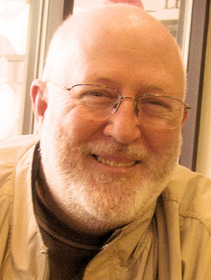A Play by Douglas Carter Beane
Directed by Joey DeMita
January 25-27
F.U.D.G.E. Theatre Company
At the Factory on Tremont Street
Review by Zvi A. Sesling
This is my second encounter with The
F.U.D.G.E. Theatre Company having first seen their production of
Parade in October. The current production of As Bees In
Honey Drown is a marvelous adaptation, directed by Joey DeMita
who also directed Parade.
What DeMita brings to the performance
is minimalist staging, the ability to work with few props and
instilling a superb sense of timing by his actors. The play follows
Alexa Vere De Vere deliciously portrayed by Linda Goetz. Alexa is a
grifter
who seduces everyone with her English
charm, runs up their credit cards and disappears from their lives as
quickly as their credit card is maxed. She plies her unique talent
on a number of fawning victims, the last of whom is Evan Wyler, a
young somewhat naive writer. He has completed his first novel and is
searching for new material when Alexa sinks her conning claws into
his psyche. Even though Evan prefers men, he falls for Alexa –
hook, line and credit card.
As the play
unfolds, we learn of Alexa’s previous conquests: Kaden, the
recording mogul, Mike, the artist and Illya. Each remains silent
about being “sucked into” Alexa’s wiles because of their
embarrassment. However, as wily as Alexa is, Evan, who has been
educated about Alexa’s talents, exacts revenge by writing a
tell-all book. As Alexa says in the play’s best
line: “Maybe writers get the last word because they know so many of
them.”
One scene is
reminiscent of Donizetti’s spectacular sextet in the opera Lucia
di Lammermoor. Various characters vent their anger until six
soloists release their fury. In this play, the actors have a
multi-line telephone conversation starting with one and adding until
all are saying something different, all five speaking simultaneously.
It takes talent to complete this without error, and these actors are
more than capable of handling the difficulty.
As
for the actors, Linda Goetz makes a perfect Alexa Vere De Vere, with
English accent, body language and hand motions to match her
delectable on stage persona. About eighty percent of the dialogue in
the play is spoken by Goetz’ flawless and entertaining delivery.
As the center of play she is terrific.
As
I was exiting the theater I heard someone remark “Evan Wyler looks
too young, so is not convincing.” But I would offer that is
exactly the role Ryan MacPherson is supposed to play. Younger than
Alexa, easily impressionable and captivated by a woman for the first
time, he does a competent job as Wyler.
Frank
Consolo is a true scene stealer. As the haberdasher, he plays the
stereotyped gay with humor that even the most ardent opponent of
stereotyping would enjoy. He flips from his gay role to ruffian
portrayal in the manner of Bobcat Goldthwaite and finally plays Mike,
a gay artist who lived with Alexa when she was Brenda, a New York
nobody. Consolo brings a convincing earnestness to his roles.
Ross
Brown comes alive as a big time recording executive talking realism
to Wyler’s fantasy of Alexa. He tells of his own embarrassment and
acts the way you would expect a thirty something seemingly big shot
exec to act.
Julia
Bailey has a certain grace, a dancer’s movement in the way she
glides in and out of the scenes. Coupled with her winning smiles, she
too fits her multiple roles enthusiastically and blends easily with
the other actors.
Mimi
Augustin provides facial expressions better than most well-known
actors I have seen. Playing several roles does not mean she sloughs
them off; on the contrary she is hilarious as the male
physique-loving secretary to the record exec, and others.
Joey
DeMita, whose direction I have seen twice, is a top notch director
who pays attention to the message of the play, assuring the actors
are well rehearsed with impeccable timing.
F.U.D.G.E.
is one of the better acting groups in greater Boston, and perhaps
they will bring back As Bees In Honey Drown
so the play will be enjoyed by an even
wider audience.
_____________________________________________________
Zvi A. Sesling
Reviewer, Boston
Area Small Press and Poetry Scene
Author, King
of the Jungle and Across
Stones of Bad Dreams
Editor, Muddy
River Poetry Review
Editor,
Bagel Bards Anthology 7
Editor,
Bagel Bards Anthology 8






































